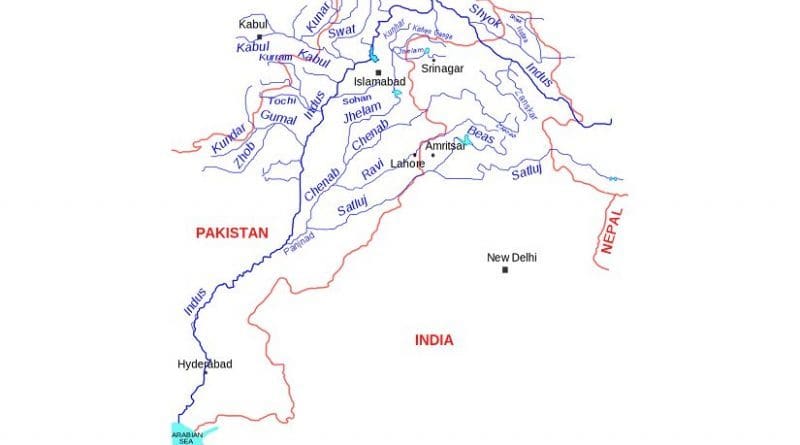Violation Of Indus Water Treaty? – OpEd
The liberal water-sharing pact known as Indus-Water Treaty was signed by Pakistani President Ayub Khan and Indian Prime Minister Jawaharlal Nehru on September 19, 1960, in Karachi and the water of six rivers-Beas, Ravi, Sutlej, Indus, Chenab and Jhelum was shared between two countries.
This landmark pact was brokered by World Bank. Since this agreement, India and Pakistan have fought three major wars and there is a constant strain on their diplomatic relations, but thus far the treaty has survived despite the severe nature of relations between both countries.
Recently, Indian Premier Narendra Modi stated that, “Blood and Water can’t flow simultaneously,” but in fact, this Indian move will simultaneously flow blood over water.
Historically, the partition of Sub-continent created a conflict over the water of the Indus Basin. The newly born states were unable to share water and manage an essential and cohesive network of irrigation. Moreover, during the partition, the tributaries of the Indus Basin were given to India and Pakistan felt its livelihood threatened by the possibility of Indian control over the tributaries that bolstered water into the Pakistani portion of Indus Basin.
The IW system of rivers comprises of three Eastern Rivers, the Sutlej, the Beas and the Ravi while three western rivers are the Indus, the Jhelum, and the Chenab. As per arrangements, Ravi, Beas, and Sutlej, which constitute the eastern system, are exclusively allocated to India. Similarly, Pakistan was allowed exclusive use of western rivers and India was bound to supply water to Pakistan for 10 years until Pakistan was able to construct a canal system for the utilization of water of Indus, Jhelum, and Chenab.
Initially, the water was divided by Inter-Dominion accord of May 4, 1948. This understanding obliged India to release sufficient waters to the Pakistani regions in return for an annual payment from Government of Pakistan. The accord was meant for the permanent solution of water between India and Pakistan, but none of them was eager to trade off their particular positions and arrangements achieved a stalemate. Pakistan attempted to take the matter to the International Court of Justice (ICJ) for the peaceful settlement of dispute, but India refused, instead arguing that the issue be resolved bilaterally.
The treaty has placed limitations on the design and operation of hydroelectric plants, storage works and other river works that are to be constructed by India on the western rivers. India is bound to provide information relating to these works in advance while Pakistan has right to communicate its objection with India.
The Indus Water Treaty was meant for resolving issues bilaterally, but now the water dispute is intensely politicized in India because hawks in that country are publicaly demanding for abrogating the treaty without realizing the side effects or rationality of their demand. Indeed, their demand is an attempt of pushing both countries toward the brink of war.
Following the terrorist attack on the Indian Parliament in 2001, key policymakers in India asked the government to scrape the Indus Water Treaty. The Atal Bihari Vajpayee government made no intimation because such a move would be considered as a violation of Indus Water Treaty. Prior to this, the Kargil conflict happened and a transition was seen in their defence posture from conventional to nuclear. In this situation, Indian Premier Atal-Bihari Vajpayee felt the need for normalizing ties with Pakistan and visited Lahore where he signed the Lahore declaration with Nawaz Shareef. It was a wise decision praised by social and political leaders of both countries.
The legal instrument had so far been sustained and delivered — despite ups and downs in Indo-Pak relations — but it is now that for the first time that Modi’s government has called for abrogating IWT. The possible reason behind this statement is that the Modi government has lost its credibility and capability in delivering good governance. Hence, it has come down to terrorist activities likes abrogating IWT. In this way, Modi’s statement is an attempt to divert the mind of people and gain anti-Pakistan sympathy.
It is not so easy to scrap the Indus Water Treaty because World Bank is the mediator, while certain restrictions are implemented on both parties in case of violating the treaty. The article nine of IWT provides a better explanation and restricts both countries from violating the Indus Water Treaty. Simultaneously, the treaty can’t be scraped unilaterally. Without consultation with Pakistan, such an Indian move would be treated as an act of war and again it might trigger conflict between hostile neighbors over water, which has serious consequences for both countries.
Pakistan is an agricultural country and water is the source of survival. Similarly, Indian robbery over water will never be accepted from Pakistan side. In fact, it is the matter 180 million lives. In this situation, Indian ambitions of scraping the Indus Water Treaty is dangerous.
Linking water with security, is a narrow-minded approach as there should be no connection with war. As such, these policies will not only make India and Pakistan,but the entire region too. In this situation, the leaders should come up with durable solutions, rather than triggering hostility.
In conclusion, Modi’s claim of withdrawing from the Indus Water Treaty is nothing more than a political and strategic stunt. Modi’s statement is a major blow within the country and it would be political suicide in international forums.
The writer is a Research Affiliate at Strategic Vision Institute Islamabad and he can be reached as [email protected]/[email protected]


First stop terrorism exporting.Then talk about sharing water etc.Indians don’t hate Pakistanis.Indians hate terrorist.